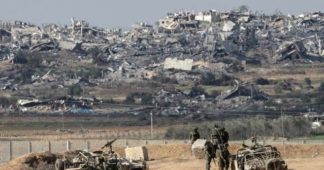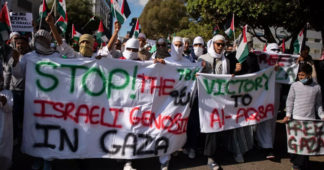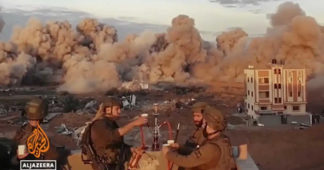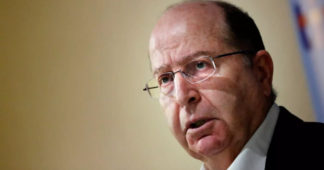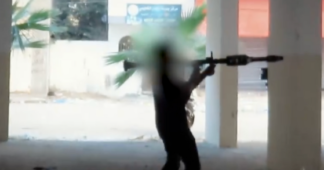The internal EU document may strip European foreign ministers of “plausible deniability” in Israeli war crimes in Gaza, experts said.
By Arthur Neslen
European Union foreign ministers rebuffed a call to end arms sales to Israel last month, despite mounting evidence of war crimes — and, potentially, genocide — presented to them in an internal assessment obtained by The Intercept.
The contents of the previously unknown 35-page assessment could sway future war crimes trials of EU politicians for complicity in Israel’s assault against Gaza, according to lawyers, experts, and political leaders.
The appraisal was written by the EU’s special representative for human rights Olof Skoog and sent to EU ministers ahead of a council meeting on November 18, as part of a proposal by the head of the EU’s foreign policy to suspend political dialogue with Israel. The proposal was rejected by the council of foreign ministers from EU member states.
Skoog’s analysis laid out evidence from United Nations sources of war crimes by Israel, Hamas, and Hezbollah since October 7, 2023, when around 1,200 people were killed during a Hamas-led attack that prompted Israel’s assault on the Gaza Strip. The U.N. estimates some 45,000 people have died in Gaza since, with more than half estimated to be women and children.
Though the assessment did not spare Hamas and Hezbollah, much of its strongest language was reserved for the Israel Defense Forces.
“War has rules,” the paper says. “Given the high level of civilian casualties and human suffering, allegations focus mainly on how duty bearers, including the Israeli Defence Forces (IDF), have seemingly failed to distinguish between civilians and combatants and to take all feasible precautions to protect civilians and civilian objects against the effects of the attacks, in violation of the fundamental principles of IHL” — international humanitarian law.
Skoog cites an increased use of “dehumanizing language” by Israeli political and military leaders, which may “contribute to evidence of intent” to commit genocide.
“Incitement to discrimination, hostility or violence — such as that made in statements by Israeli officials — constitutes a serious violation of international human rights Law and may amount to the international crime of incitement to genocide,” the paper says.
The implications for senior officials from arms-exporting countries to Israel — such as Germany, Italy and France — were not lost on Yanis Varoufakis, the former Greek finance minister and secretary-general of the Democracy in Europe Movement 2025.
If the International Criminal Court finds Israeli officials guilty of war crimes, Varoufakis told the Intercept, the very distribution of the report to EU ministers carries significance because the Europeans will not be able plead ignorance.
“They cannot plausibly deny that they were privy to the facts given the contents of the EU’s special representative’s report that they had a duty to take under consideration,” Varoufakis said. “The world now knows that they knew they were in breach of international law because they were explicitly told so by the EU’s own special representative on human rights. History will judge them harshly. And perhaps so will the ICC.”
Blocked Diplomatic Action
The paper arose from a February request by Spain and Ireland to evaluate whether Israel’s war in Gaza violated human rights articles in the EU–Israel Association Agreement, which, among other things, enabled some 46.8 billion euros of trade in 2022.
If the European Commission had identified a breach, it would have brought a suspension of the agreement onto the agenda. The Commission’s pro-Israel President Ursula von der Leyen, however, declined to act.
Consequently, Skoog was commissioned by the EU’s foreign service, the European External Action Service, to investigate. He produced an initial assessment in July. The Intercept obtained a version of the assessment that was updated in November.
The document, which has not been previously reported, was discussed internally as part of the EU’s foreign service propsal to suspend “political dialogue” with Israel, the only aspect of the relationship the union’s foreign service has power over; Skoog’s paper effectively backed the plan to freeze it. The proposal, however, was rejected by the EU ministers, along with a de facto recommendation to ban arms exports to Israel.
The report found that because the death toll in Gaza corresponds to the demographic breakdown of the territory’s civilian population, the pattern of killing indicated “indiscriminate attacks” that could constitute war crimes.
“When committed as part of a widespread or systematic attack against a civilian population,” the assessment added, “they may also implicate crimes against humanity.”
Skoog called on EU countries to “deny an export licence” — for arms — “if there is a clear risk that the military technology or equipment to be exported might be used in the commission of serious violations of international humanitarian law.”
In the wake of the assessment, some EU politicians will be at risk of complicity if Israel is found to have committed war crimes, said Tayab Ali, a partner in the U.K. law firm Bindmans, which recently took the British government to court over its arms exports to Israel.
“Lawyers across Europe are watching this closely and likely to initiate domestic and international accountability mechanisms. Economic interests are not a defence to complicity in war crimes,” Ali told The Intercept. “It is astounding that, following the contents of this report, countries like France and Germany might even remotely consider raising issues of immunity to protect wanted war criminals like Netahyahu and Gallant” — referring to Israeli Prime Minister Benjamin Netanyahu and former Defense Minister Yoav Gallant.
Diana Buttu, a former legal adviser and negotiator for the Palestinian Authority suggested that the rejection of the EU’s own analysis by its member states was political.
“Legally, we know where the dominoes should be falling,” Buttu said. “It was a question of whether the politics would match with the law, and unfortunately, they did not.”
“Criminal Collusion”
Skoog’s paper pulls no punches in its treatment of Hamas’s atrocities on October 7, describing hostage-taking, for instance, as “a violation of international humanitarian law and a war crime.”
Rocket attacks by Hamas and Hezbollah were “inherently indiscriminate … and may constitute a war crime,” it says.
The probe also calls out the use of tunnels in civilian areas as being tantamount to using human shields, which is also a war crime. The Israeli military, however, had not offered “substantial evidence” to back up this allegation, which, even if proven, would not justify indiscriminate or disproportionate attacks on civilian areas.
The paper rebuts a major Israeli defense against war crimes allegations over the targeting of hospitals in the Gaza Strip. Skoog’s assessment argues that the “intentional targeting of hospitals … may amount to war crimes,” regardless of any Hamas activity there.
Skoog’s assessment says international law allows Israel “the right and indeed the duty to protect its population,” but that this can only be exercised in response to an armed attack or imminent attack and must be proportional. Because it is an occupying power, the assessment says, Israel also had an obligation to ensure safety and the health of those living under occupation.
Agnès Bertrand-Sanz, an Oxfam humanitarian expert, said the assessment “reinforces the case that EU governments have been acting in complicity with Israel’s crimes in Gaza.”
“Even when their own services presented them with the facts, they refused to act,” she said. “Those that continued exporting arms to Israel in defiance of the report’s clear advice, are involved in a blatant case of criminal collusion.”
We remind our readers that publication of articles on our site does not mean that we agree with what is written. Our policy is to publish anything which we consider of interest, so as to assist our readers in forming their opinions. Sometimes we even publish articles with which we totally disagree, since we believe it is important for our readers to be informed on as wide a spectrum of views as possible.
